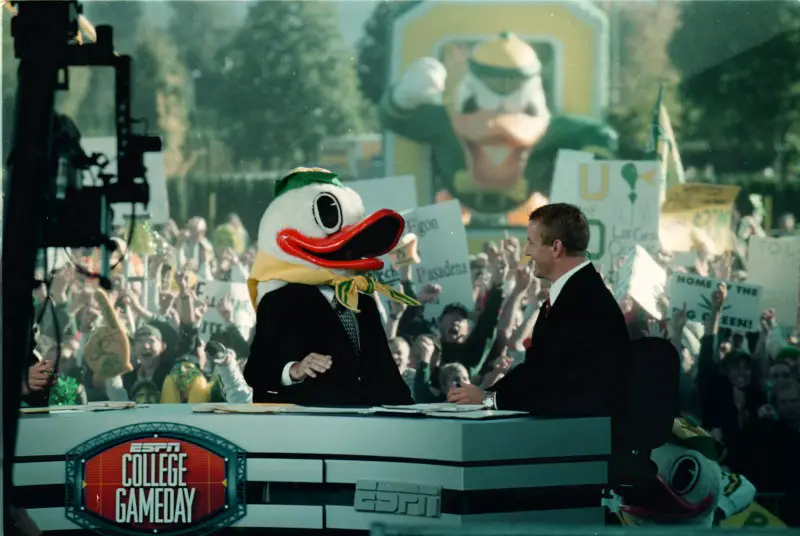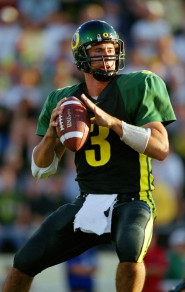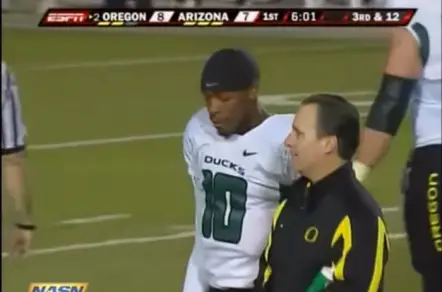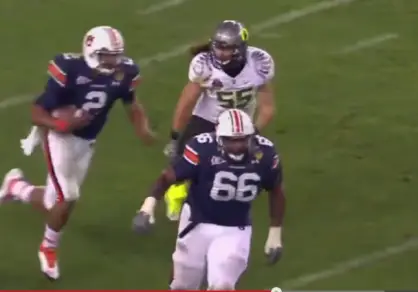With another National Championship at stake, the 2014 Ducks are attempting to accomplish something that no team before them in program history has done successfully. Under the new College Football Playoff system, the Ducks are one semifinal win away from returning to the title game, which would be their first appearance since 2011.
Although that 2010-2011 team was the first to appear in a title game in the BCS era, a couple other teams came close. But all of those teams had a fatal flaw that kept them from winning it all. Let’s take a closer look at each of them:
2001
Joey Harrington’s senior season as the Ducks’ signal-caller was arguably the best of his three-year college career. In addition to being named a finalist for the Heisman Trophy, Harrington helped the Ducks build on a successful 2000 season to reach new heights.
The Ducks started the 2001 season 6-0, including two huge, comeback wins against Wisconsin and USC. Going into a home game against unranked Stanford, the 6-0 Ducks were ranked No. 5 in the AP Poll.
The Ducks led, 42-28, over the Cardinal, but they eventually blew the lead by giving up three consecutive touchdown drives to lose, 49-42. Yes, Stanford’s reputation ruining Duck seasons dates back farther than you might’ve previously thought.
This was the only loss of the season for the Ducks, as they finished the regular season 10-1 and a No. 2 ranking in the AP Poll. The BCS standings were not as kind, however. Despite losing in the last game of the regular season to Colorado, the BCS controversially elected to put a 10-1 Nebraska squad in the national championship over Oregon.
The Ducks were instead chosen to play that same Colorado team in the Fiesta Bowl. Playing with an extra chip on their shoulder, the Ducks dominated from the get-go and won, 38-16. The victory left many people wondering what could’ve been if Oregon and Miami played for the national championship.
Fatal Flaw: The inability to get out of their own way
Had the Ducks not lost a head-scratching game to Stanford, we wouldn’t be discussing the controversial decision to leave them out of the title game. Leading by two touchdowns in the fourth quarter, this is what happened in three drives for the Ducks: blocked punt, onside recovery by Stanford, interception. Three huge, momentum-swinging plays that led to 21 unanswered points and a win for Stanford. If Ducks offense burned some clock and cut out even just one of those avoidable mistakes, they likely would’ve won the game.
2007
Led by the outstanding quarterback-running back tandem of Dennis Dixon and Jonathan Stewart, the 2007 Ducks offered a glimpse of the future of dynamic Oregon offenses to come. Not so coincidentally, this was also Chip Kelly’s first season as offensive coordinator.
Although they were not being ranked in any preseason polls, the Ducks turned many heads quickly by jumping out to an 8-1 start. Dixon was the leading Heisman candidate at this point in the season and the Ducks capitalized on slip-ups from several other contenders to reach No. 2 in the BCS and AP polls. They were in great position to reach the title game if they could win out.
The season-defining game came in a Thursday night nationally-televised matchup against an Arizona team that was unranked, yet still very dangerous. Sound familiar?
The Ducks led 8-7 in the first quarter when Dixon fell to the turf untouched and began writhing in pain. Replays showed that he awkwardly twisted his knee while trying to switch directions. This play ended Dixon’s season and the Ducks went on to lose this game and the next two before winning a meaningless Sun Bowl game against South Florida.
Fatal Flaw: Too much reliance on Dixon
As Dixon went down, so too did the Ducks’ national championship aspirations. In the weeks that followed, the likes of Cody Kempt and Justin Roper showed that the Ducks offense was much less imposing without a legitimate dual-threat quarterback. Kelly’s first year running the offense was imperfect because the system didn’t exactly match the personnel at the time, but Dixon’s running and passing abilities made it look much smoother. When his season tragically ended on that Thursday night in Arizona, the Ducks were toast without him.
2010
Unlike the two previously mentioned teams, the 2010 Ducks made it through the regular season relatively unscathed. No major, season-changing injuries and although there were several close calls, the Ducks went undefeated in the regular season and earned the right to play Auburn in the national championship.
This was Kelly’s second season as head coach and his system was nearing perfection. The team averaged 47 points per game, and the defense, although not dominant, was reliable in the few cases when the offense wasn’t.
The Ducks faced an Auburn team that sharply contrasted their style. While the Ducks had a speed advantage, Auburn countered with the power and size typical of an SEC team. Their quarterback, Cam Newton, was that year’s Heisman trophy winner and undoubtedly the nation’s best player.
While the Ducks’ defense put forth a great effort in slowing Newton and his offense down, the offense was far from their usual self. They rallied late in the game with a LaMichael James touchdown to tie the score, but then were caught on the wrong side of the ensuing drive when Auburn running back Michael Dyer broke a 37-yard run in which he appeared to be down on initial contact. Replays said otherwise, however, and Auburn was able to escape with a game-winning field goal. This seemed like the Ducks’ best shot to win a title, but they came up short.
Fatal Flaw: Weakness in the trenches against bigger teams
While the Ducks’ spread offense appeared too fast for defenses to stop at times, they had mixed results against teams with bigger and stronger linemen.
This was especially true in the title game. Runs up the middle rarely worked against Auburn, particularly on a 4th-and-goal stop and a safety. Auburn’s win happened during a six-year stretch of SEC wins in the national championship. The Ducks were arguably the closest team to ending the streak, but ultimately the SEC power prevailed once again.
Feature Photo by John Giustina
Related Articles:
Chip Kelly Update: Everything's Good Again ...
Chip Kelly Update: Wailing and Gnashing of Teeth
Shock and Awe -- The Oregon Ducks' Football Hangover Effect
Despite Lopsided Score, Georgia State "Never Stopped Believing"
Hope Springs Eternal for Ducks
Incompetent Pac-12 Officials: How Do You Miss ALL of THIS?
Will Denner is a junior at the University of Oregon majoring in journalism with a focus in electronic media. Since he worked for The Oregonian as a freelance sports reporter, he has known for sure that he wants to pursue a career in the field of journalism. Will is most passionate and knowledgeable about Oregon Ducks football, basketball and softball. You can follow him on Twitter @will_denner




